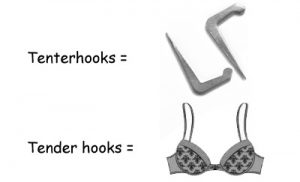
Here at ProofreadingPal, we have a lot of clients who speak English as a second (or third, or whatever) language. As someone whose only Spanish skill is to ask for a drink or a bathroom and whose only German is to note that the record player is broken (long story), I’m deeply respectful of the effort involved in becoming fluent in a nonnative language.
It’s not just the vocabulary and grammar, after all, that are required for being fluent, but also enough knowledge of the language’s culture and etymology to use idioms properly. In fact, the correct use of idioms (standardized phrases not to be taken literally) is so complex that even native English speakers sometimes drop the ball.
(See that? “Drop the ball.” That’s an idiom.)
Get a free sample proofread and edit for your document.
Two professional proofreaders will proofread and edit your document.
Fortunately, most idioms are fairly self-explanatory. “Drop the ball” makes sense the first time you hear it (unless you grew up in some repressive, ball-banning village that also forbids lollipops and smiling). Others that you can readily work out include “spending time,” “making ends meet,” “blessing in disguise,” and “hitting the nail on the head.”
But being fluent in a language doesn’t just mean memorizing a list of idioms (hundreds of which will come up on a quick Google search). You have to know how and when to use them. When the idiom itself is familiar (“strike while the iron is hot”), its proper application is usually straightforward.
But sometimes the use of an idiom is more complex than just popping one in like a Lego brick. Some idioms need special handling in their application to keep you from sounding like you’re not sure of what you mean.
To show what I mean, here are just three of the most common errors of this type.
On the Other Hand
Here’s the one I see most often, by far. People really seem to like this idiom, perhaps because it’s so easy to envision. Two options are weighed, one in each hand, and you test the balance. The problem comes in the actual use of the idiom because “on the other hand” isn’t to be used like “however” or “meanwhile.” It doesn’t mean “Oh, and here’s something in my other hand.” The point of the idiom is that two things (and really only two) are to be evaluated against each other, perhaps on multiple points.
Incorrect: I like apples. On the other hand, grapes and oranges are good too.
Correct: On the one hand, buying a condo makes more sense than buying a house in this area because I can get a good deal; on the other hand, buying a house means I don’t have to get permission to make changes to my property.
Literally
I’m afraid this error is a hot one right now, making English teachers cry and lining the pockets of online editors! The correct use of “literally” as an idiom means that what you are saying is 100 percent factual, true, realistic, and completely literal as opposed to figurative. You use it to stress that you’re not exaggerating.
Correct: I literally cannot pay the rent this month.
Incorrect use of “literally” treats it like the words “very” or “really,” as in “with great impact.” But “literally” is quite different from such words because it requires nonfigurative language.
Incorrect: It would literally kill me to pay the rent this month.
Figurative language is a great part of communication and a wonderful thing, as long as you don’t claim figures of speech are “literally” true. It won’t literally kill you to pay the rent. It will literally kill you to jump into a lava flow.
Piqued My Interest
Now, this one is different from most misspelled idioms. Misspellings of idioms (e.g., on tenderhooks, sing a little diddy) of idioms work the same as all other misspellings and usually come from mishearing words. You fix the spelling, and you’re fine.
 This idiom often gets misspelled and misused because the misspelling seems to make sense. “Peaked my interest” would seem to mean “brought my interest to a peak.” However, this idiom comes from the French word “piqued,” as in “aroused,” and that is how the idiom is to be used.
This idiom often gets misspelled and misused because the misspelling seems to make sense. “Peaked my interest” would seem to mean “brought my interest to a peak.” However, this idiom comes from the French word “piqued,” as in “aroused,” and that is how the idiom is to be used.
You don’t say “piqued my interest” when you are absolutely fascinated by something, but rather when you are just a little intrigued, diverted from what you were thinking about before, or surprised to find something you want to follow up on. It has the same level of emotional impact as “caught my eye.”
Incorrect: His love and understanding of my needs really peaked my interest in the relationship. We were married the next week.
Correct: His blue eyes sparkled and piqued my interest. I said hello.
So, just as it’s a bad idea to grab a word you don’t really understand from a thesaurus and stick it in your sentence, it’s perilous to use an idiom without understanding not just its basic translation, but also how the idiom is to be applied. If you’re not completely sure, ask a teacher, a friend, or the friendly editors here at ProofreadingPal.
Julia H.
Get a free sample proofread and edit for your document.
Two professional proofreaders will proofread and edit your document.
Get a free sample proofread and edit for your document.
Two professional proofreaders will proofread and edit your document.
We will get your free sample back in three to six hours!